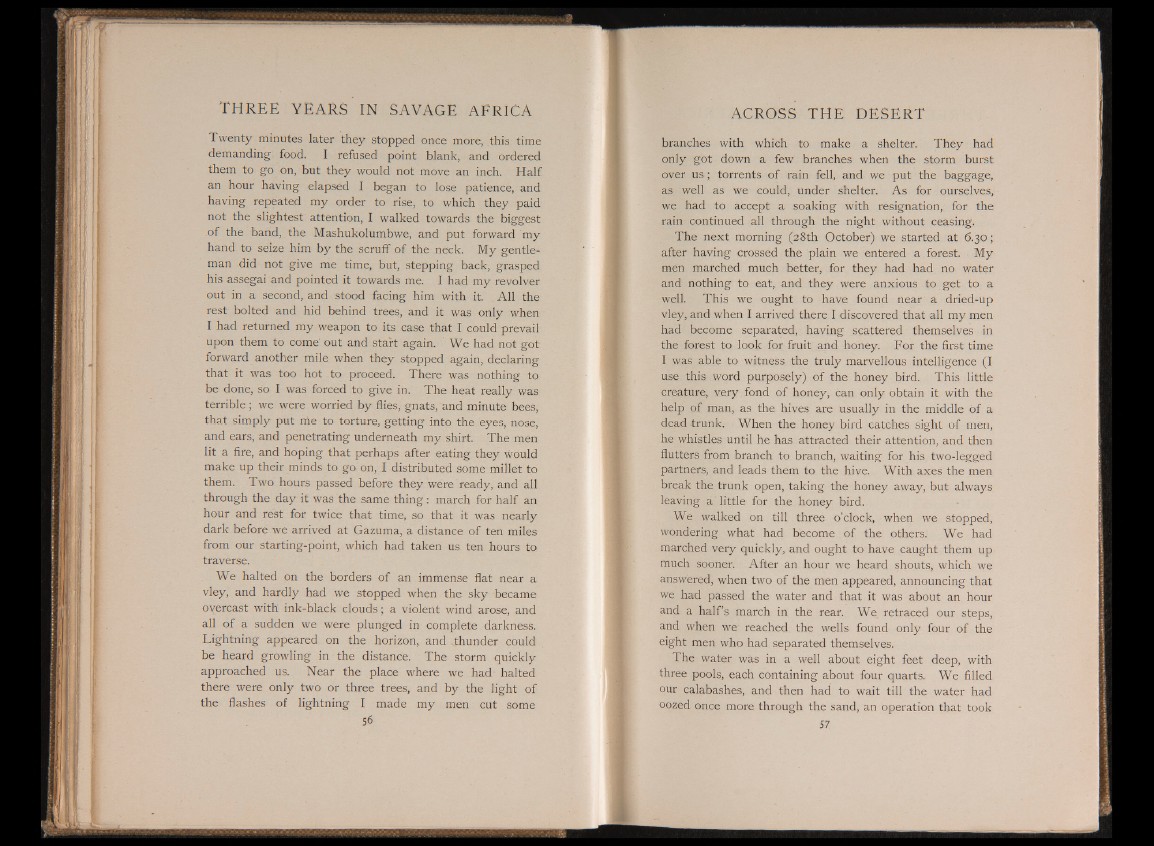
Twenty minutes later they stopped once more, this time
demanding food. I refused point blank, and ordered
them to go on, but they would not move an inch. Half
an hour having elapsed I began to lose patience, and
having repeated my order to rise, to which they paid
not the slightest attention, I walked towards the biggest
of the band, the Mashukolumbwe, and put forward my
hand to seize him by the scruff of the neck. My gentleman
did not give me time, but, stepping back, grasped
his assegai and pointed it towards me. I had my revolver
out in a second, and stood facing him with it. All the
rest bolted and hid behind trees, and it was only when
I had returned my weapon to its case that I could prevail
upon them to come' out and start again. We had not got
forward another mile when they stopped again, declaring
that it was too hot to proceed. There was nothing to
be done, so I was forced to give in. The heat really was
terrible; we were worried by flies, gnats, and minute bees,
that simply put me to torture, getting into the eyes, nose,
and ears, and penetrating underneath my shirt. The men
lit a fire, and hoping that perhaps after eating they would
make up their minds to go on, I distributed some millet to
them. Two hours passed before they were ready, and all
through the day it was the same thing: march for half an
hour and rest for twice that time, so that it was nearly
dark before we arrived at Gazuma, a distance of ten miles
from our starting-point, which had taken us ten hours to
traverse.
We halted on the borders of an immense flat near a
vley, and hardly had we stopped when the sky became
overcast with ink-black clouds; a violent wind arose, and
all of a sudden we were plunged in complete darkness.
Lightning appeared on the horizon, and thunder could
be heard growling in the distance. The storm quickly
approached us. Near the place where we had halted
there were only two or three trees, and by the light of
the flashes of lightning I made my men cut some
56
branches with which to make a shelter. They had
only got down a few branches when the storm burst
over u s; torrents of rain fell, and we put the baggage,
as well as we could, under shelter. As for ourselves,
we had to accept a soaking with resignation, for the
rain continued all through the night without ceasing.
The next morning (28th October) we started at 6.30;
after having crossed the plain we entered a forest. My
men marched much better, for they had had no water
and nothing to eat, and they were anxious to get to a
well. This we ought to have found near a dried-up
vley, and when I arrived there I discovered that all my men
had become separated, having scattered themselves in
the forest to look for fruit and honey. For the first time
I was able to witness the truly marvellous intelligence (I
use this word purposely) of the honey bird. This little
creature, very fond of honey, can only obtain it with the
help of man, as the hives are usually in the middle of a
dead -trunk. When the honey bird catches sight of men,
he whistles until he has attracted their attention, and then
flutters from branch to branch, waiting for his two-legged
partners, and leads them to the hive. With axes the men
break the trunk open, taking the honey away, but always
leaving a little for the honey bird.
We walked on till three o’clock, when we stopped,
wondering what had become of the others. We had
marched very quickly, and ought to have caught them up
much sooner. After an hour we heard shouts, which we
answered, when two of the men appeared, announcing that
we had passed the water and that it was about an hour
and a half’s march in the rear. We retraced our steps,
and when we reached the wells found only four of the
eight men who had separated themselves.
The water was in a well about eight feet deep, with
three pools, each containing about four quarts. We filled
our calabashes, and then had to wait till the water had
oozed once more through the sand, an operation that took